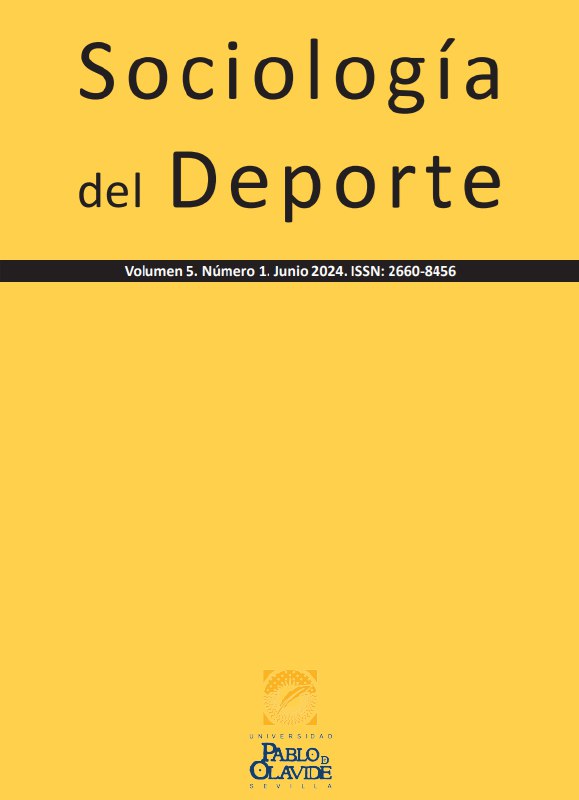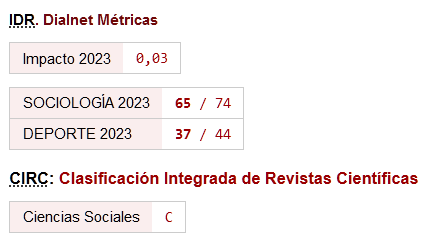The unseen battle:
Exploring the intersection between mental health struggles in elite athletes
DOI:
https://doi.org/10.46661/socioldeporte.9601Keywords:
Mental health, Elite athletesAbstract
The focus of developmental research in the past decade has accentuated the critical nature of acknowledging the mental health of elite athletes. Professionals and researchers have come together to recognise the susceptibility of elite athletes to mental health challenges at a level similar to that of the general population (Moesch et al., 2018; Poucher & Cairney, 2021). Elite athletes are recognised to experience a diverse range of disorders such as anxiety, depression, eating disorders, and substance abuse, which can be influenced by a number of aspects related to their athletic career, performance, and external factors (Rice & Parker, 2016). The notion of ‘mental health’ has been described in many ways. According to the World Health Organisation, mental health is defined as “a state of well-being in which every individual realises his or her own potential, can cope with the normal stresses of life, can work productively and fruitfully, and is able to make a contribution to her or his community” (World Health Organisation, 2014). This given definition highlights that mental health goes beyond the absence of disorders and emphasises the capacity of an individual to achieve optimal well-being. Furthermore, the American Psychiatric Association defines ‘mental disorders’ as “a syndrome characterised by clinically significant disturbance in an individual's cognition, emotion regulation, or behaviour that reflects a dysfunction in the psychological, biological, or developmental processes underlying mental functioning,” including conditions such as eating disorders, depression, and anxiety (American Psychiatric Association, 2013).
Downloads
References
Abbott, W., Brownlee, T. E., Harper, L. D., Naughton, R. J., Richardson, A., & Clifford, T. (2019). A season long investigation into the effects of injury, match selection and training load on mental wellbeing in professional under 23 soccer players: A team case study. European Journal of Sport Science, 19(9), 1250-1256. https://doi.org/10.1080/17461391.2019.1600586
American Psychiatric Association. (2013). Diagnostic and statistical manual of mental disorders (5th ed.). Arlington, VA: American Psychiatric Publishing. https://doi.org/10.1176/appi.books.9780890425596
Breslin, G., Shannon, S., Haughey, T., Sarju, N., Neill, D., Leavey, G., & Lawlor, M. (2021). Athlete and nonathlete intentions to self-manage mental health: applying the integrated behavior change model to the state of mind program. Journal of Applied Sport Psychology, 33(1), 83-97. https://doi.org/10.1080/10413200.2019.1629547
Brown, J. C., Kerkhoffs, G., Lambert, M. I., & Gouttebarge, V. (2017). Forced retirement from professional rugby union is associated with symptoms of distress. International journal of sports medicine, 38(08), 582-587. https://doi.org/10.1055/s-0043-103959
Carless, D., & Douglas, K. (2016). Promoting mental health in youth sport. In Positive youth development through sport (pp. 216-226). Routledge. https://doi.org/10.4324/9781315709499-18
Castaldelli-Maia, J. M., e Gallinaro, J. G. D. M., Falcão, R. S., Gouttebarge, V., Hitchcock, M. E., Hainline, B., ... & Stull, T. (2019). Mental health symptoms and disorders in elite athletes: a systematic review on cultural influencers and barriers to athletes seeking treatment. British Journal of Sports Medicine, 53(11), 707-721. https://doi.org/10.1136/bjsports-2019-100710
Emmonds, S., Till, K., Weaving, D., Burton, A., & Lara-Bercial, S. (2024). Youth sport participation trends across Europe: Implications for policy and practice. Research quarterly for exercise and sport, 95(1), 69-80. https://doi.org/10.1080/02701367.2022.2148623
Eather, N., Wade, L., Pankowiak, A., & Eime, R. (2023). The impact of sports participation on mental health and social outcomes in adults: a systematic review and the 'Mental Health through Sport'conceptual model. Systematic Reviews, 12(1), 102. https://doi.org/10.1186/s13643-023-02264-8
Gerber, M., Kellmann, M., Brand, S., Gygax, B., Ludyga, S., Müller, C., ... & Gerber, M. (2022). Differences in mental health outcomes between adolescent elite athletes and peers not engaged in elite sport. Current Issues in Sport Science (CISS), 7, 013. https://doi.org/10.36950/2022ciss013
Gouttebarge, V., Hopley, P., Kerkhoffs, G., Verhagen, E., Viljoen, W., Wylleman, P., & Lambert, M. (2018). A 12-month prospective cohort study of symptoms of common mental disorders among professional rugby players. European journal of sport science, 18(7), 1004-1012. https://doi.org/10.1080/17461391.2018.1466914
Haugen, E. (2022). Athlete mental health & psychological impact of sport injury. Operative Techniques in Sports Medicine, 30(1), 150898. https://doi.org/10.1016/j.otsm.2022.150898
Larsen, C., Moesch, K., Durand-Bush, N., & Henriksen, K. (Eds.). (2021). Mental health in elite sport: Applied perspectives from across the globe. Routledge. https://doi.org/10.4324/9780367854973
McLoughlin, E., Fletcher, D., Slavich, G. M., Arnold, R., & Moore, L. J. (2021). Cumulative lifetime stress exposure, depression, anxiety, and well-being in elite athletes: A mixed-method study. Psychology of sport and exercise, 52, 101823. https://doi.org/10.1016/j.psychsport.2020.101823
Moesch, K., Kenttä, G., Kleinert, J., Quignon-Fleuret, C., Cecil, S. and Bertollo, M., 2018. FEPSAC position statement: Mental health disorders in elite athletes and models of service provision. Psychology of Sport and Exercise, 38, pp.61-71. https://doi.org/10.1016/j.psychsport.2018.05.013
Oltmans, E., Confectioner, K., Jonkers, R., Kerkhoffs, G. M., Moen, M., Verhagen, E., ... & Gouttebarge, V. (2022). A 12-month prospective cohort study on symptoms of mental health disorders among Dutch former elite athletes. The Physician and Sportsmedicine, 50(2), 123-131. https://doi.org/10.1080/00913847.2020.1868276
Pilkington, V., Rice, S., Olive, L., Walton, C., & Purcell, R. (2024). Athlete Mental Health and Wellbeing During the Transition into Elite Sport: Strategies to Prepare the System. Sports Medicine-Open, 10(1), 24. https://doi.org/10.1186/s40798-024-00690-z
Poucher, Z.A., Tamminen, K.A., Kerr, G. and Cairney, J., 2021. A commentary on mental health research in elite sport. Journal of Applied Sport Psychology, 33(1), pp.60-82. https://doi.org/10.1080/10413200.2019.1668496
Purcell, R., Pilkington, V., Carberry, S., Reid, D., Gwyther, K., Hall, K., ... & Rice, S. (2022). An evidence-informed framework to promote mental wellbeing in elite sport. Frontiers in Psychology, 13, 780359. https://doi.org/10.3389/fpsyg.2022.780359
Purcell, R., Pilkington, V., Carberry, S., Reid, D., Gwyther, K., Hall, K., ... & Rice, S. (2022). An evidence-informed framework to promote mental wellbeing in elite sport. Frontiers in Psychology, 13, 780359. https://doi.org/10.3389/fpsyg.2022.780359
Purcell, R., Gwyther, K. and Rice, S.M., 2019. Mental health in elite athletes: increased awareness requires an early intervention framework to respond to athlete needs. Sports medicine-open, 5(1), p.46. https://doi.org/10.1186/s40798-019-0220-1
Reardon, C.L., Hainline, B., Aron, C.M., Baron, D., Baum, A.L., Bindra, A., Budgett, R., Campriani, N., Castaldelli-Maia, J.M., Currie, A. and Derevensky, J.L., 2019. Mental health in elite athletes: International Olympic Committee consensus statement (2019). British journal of sports medicine, 53(11), pp.667-699. https://doi.org/10.1136/bjsports-2019-100715
Rice, S.M., Purcell, R., De Silva, S., Mawren, D., McGorry, P.D. and Parker, A.G., 2016. The mental health of elite athletes: A narrative systematic review. Sports medicine, 46(9), pp.1333-1353. https://doi.org/10.1007/s40279-016-0492-2
Salaheddin, K., & Mason, B. (2016). Identifying barriers to mental health help-seeking among young adults in the UK: a cross-sectional survey. British Journal of General Practice, 66(651), e686-e692. https://doi.org/10.3399/bjgp16X687313
Schuring, N., Kerkhoffs, G., Gray, J., & Gouttebarge, V. (2017). The mental wellbeing of current and retired professional cricketers: an observational prospective cohort study. The Physician and Sportsmedicine, 45(4), 463-469. https://doi.org/10.1080/00913847.2017.1386069
Smetanin, P., Briante, C., Khan, M., Stiff, D. and Ahmad, S., 2015. The life and economic impact of major mental illnesses in Canada.
Swann, C., Telenta, J., Draper, G., Liddle, S., Fogarty, A., Hurley, D., & Vella, S. (2018). Youth sport as a context for supporting mental health: Adolescent male perspectives. Psychology of sport and exercise, 35, 55-64. https://doi.org/10.1016/j.psychsport.2017.11.008
Wang, M. T., Chow, A., & Amemiya, J. (2017). Who wants to play? Sport motivation trajectories, sport participation, and the development of depressive symptoms. Journal of youth and adolescence, 46, 1982-1998. https://doi.org/10.1007/s10964-017-0649-9
Whelan, B. M., Kliethermes, S. A., Schloredt, K. A., Rao, A., Harmon, K. G., & Petek, B. J. (2024). Suicide in National Collegiate Athletic Association athletes: a 20-year analysis. British journal of sports medicine, 58(10), 531-537. https://doi.org/10.1136/bjsports-2023-107509
World Health Organization. (2014). Mental health: A state of well-being. Retrieved from http://www.who.int/features/factfiles/mental_health/en/

Downloads
Published
How to Cite
Issue
Section
License
Copyright (c) 2023 Oscar Rhodes

This work is licensed under a Creative Commons Attribution-NonCommercial-ShareAlike 4.0 International License.









